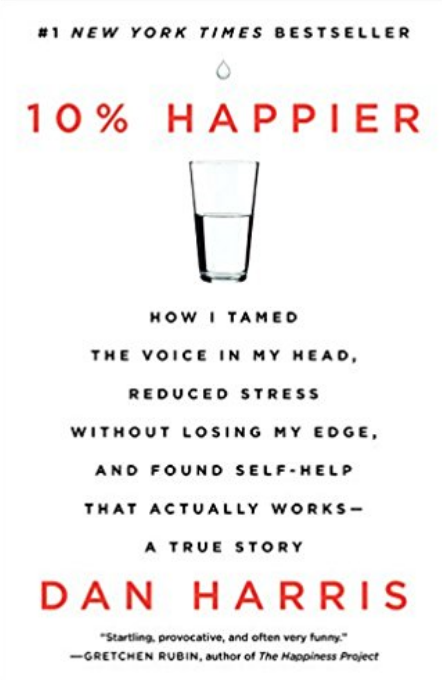Meditation for Monkey Minds
For one reason or another, there is a high concentration of type A control freaks among my friends (myself included). When I've talked with various individual friends about meditation, the responses are all generally the same.
"I'm not good at it."
"I can't clear my thoughts."
"I can't do it; it's just not for me."
After saying and thinking similar things myself, I've come to the conclusion that pretty much everyone feels this way. Meditation is HARD, not just for people who are high-strung. What I've come to understand though is that meditation isn't about turning your brain off; it's about practicing focusing it.
When I first started seeing a therapist several years ago, she recommended meditation. She taught me visualization exercises, but I didn't really feel like it was working for me. I got more out of cognitive behavioral thought logs than I did out of meditation, which felt passive to me, not active. I needed to be DOING something.
A few years ago, however, I read Dan Harris's 10% Happier: How I Tamed the Voice in My Head, Reduced Stress without Losing My Edge, and Found Self-Help That Actually Works -- A True Story.
Aside from the extremely promising title, I already knew I enjoyed Dan Harris. Because one of my college friends works for "Good Morning America," I made a habit of tuning in while I got ready for work in the mornings. Harris was on it, and I always enjoyed his quippy-ness AND his segments on his cats.
So I decided to give it a read and found myself sold on meditation. Aside from the fact that the book itself was just a pleasurable, easy read, Harris presented scientific evidence about the benefits of meditation. His writing helped me understand that meditation *is* active. Rather than trying to clear one's thoughts, it's about practicing not following your thoughts and instead returning to a point of focus, whether it's your breath, the sounds around you, or how you feel sitting in your chair. I recently heard him on a podcast saying every time you return to your point of focus, it's a bicep curl for your brain.
Although I'm not *quite* a JewBu like many of the scholars Harris cites in his book, on his recommendation, I started reading more about some of the tenets of Buddhism and began to practice experiencing the world around me without attaching emotions to it or labeling events as "good" or "bad."
Also on Harris's recommendation, I downloaded Insight Timer and started trying to meditate every morning. For a while, I was consistent, bookmarking some of my favorite guided meditations for getting up in the morning.
I'd practice meditation sitting up in bed (not ideal). "Why is this not ideal?" you might ask. Isn't meditation ultimately about fostering a sense of calm? What could be more calming than bed?
Uh, exactly.
Soon, I was practicing propped up in bed. Then, I was practicing flat on my back. Eventually, as you might have guessed, I was not practicing at all. I was instead sleeping through the guided tracks, which by this point, I knew by heart and was barely paying attention to.
This is why bed is not ideal.
Eventually, I more or less gave up on meditation. There was no moment at which I made a conscious decision to not do it or anything like that. It just stopped happening regularly without me really noticing.
Last summer I had my second surgery for endometriosis with a specialist in New York City who taught me more than I ever knew about the disease. She also recommended I take six weeks off from working out after the surgery. She said I could walk as much as I wanted, but that was it.
"How about four weeks?" I asked, as if I was haggling with one of the street vendors a few blocks over who sells knockoff designer purses.
She wasn't playing along.
When I told her I felt like exercise really had a positive, NECESSARY impact on my mental wellbeing, she suggested meditation, specifically the Headspace app. I brushed it off.
But after my workout routine was interrupted again in December, this time to have half of my thyroid removed, I finally recognized that I needed to find a way to get zen without exercise, which was not always going to be available to me because that's just the way life is. Sometimes you can work out, and sometimes you can't, and adaptability is just as important in stress reduction as physical wellbeing.
Before my thyroid surgery, I didn't know if I had cancer or not. Two biopsies came back inconclusive. The idea of going through surgery again was repellant to me on many levels. I felt like I couldn't face the anxiety surrounding anesthesia again, the postop drugs again, the recovery pain again. I had a lot of fear and a LOT of stress.
I had a particularly painful period during that cycle. Fresh waves of anxiety washed over me when I thought about how maybe the second endo surgery didn't work, and I'd need another...and another...just to have a few months of relief at a time. I went to acupuncture and cried. I went to physical therapy and cried. I went to therapy and cried.
I called my surgeon and told her what was going on. She felt strongly that this particular cycle had been affected by the extreme stress I was feeling and recommended meditation again. For people with chronic pain, the central nervous system is always lit up, leading to a kind of internal fatigue. Meditation, she said, can help soothe the nervous system, which in turn eases the pain. According to Harris, science shows that meditation actually changes your brain.
So when my best friend alerted me to the fact that Headspace was having a sale for the new year, I didn't even bother trying the free version. I just snapped up the whole shebang, and I have to tell you guys, I'm really glad I did.
For me, Headspace has been easier to stick to than Insight Timer, because while Insight Timer had some great meditation, Headspace offers meditation "packs" that progress, helping you build the skill of meditating.
I started with the basics, a set of three packs with 10 sessions each. I think I will return to them at some point and redo them. I felt great while I was doing them. I noticed myself being more present. When I was visiting my boyfriend in Florida, I had multiple moments of simply appreciating being with him and thinking about how much I love him rather than thinking about all kinds of other shit, like what I'd have to do when I got home, what was going on at work, or what we were going to eat that night.
Adorable!
Since then, I've completed the packs on pain management, sleep, and prioritization. I'm currently working my way through the stress pack. Perhaps managing anxiety is next?
I've also made use of the singles -- burned out, feeling overwhelmed, losing your temper, in pain, falling back to sleep. Many of these are only three minutes, but the reset has been so helpful.
Also, the illustrations that help depict meditation principles are freaking delightful. The explanations of concepts have refreshed me on what I originally learned in 10% Happier, and the suggestions on applications throughout the day have made me feel like it is more of the "active" process that I need to stay motivated.
The other thing that has helped me stick to meditating at least once a day this year has been tracking it as a habit in my bullet journal (more on that in another post to come).
I can't say I always feel "successful" when I do it. Sometimes a whole 10 minutes has passed and I realize I didn't think about my breath once, just about the day's to-do list ahead of me. But forgiving myself for not being perfect is also something I'm working on, so that makes meditation great for me on two levels -- 1) as a way to train my brain to be present, and 2) as a way to train the inner voice in my head to stop being such a bitch to me.
Do you meditate? Have you used Headspace or Insight Timer? Come tell me about it!
xo,
S



